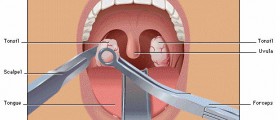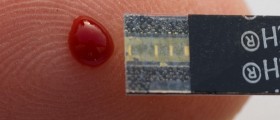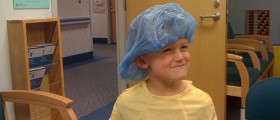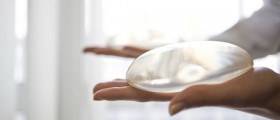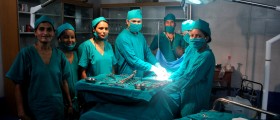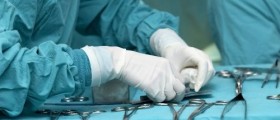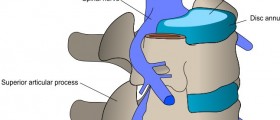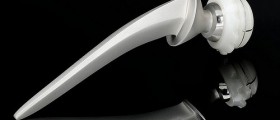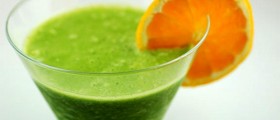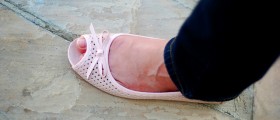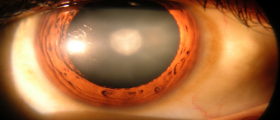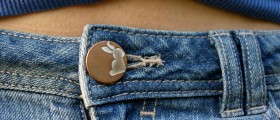Loading...
Loading...
Loading...
Loading...
I had a tonsillectomy/PV3 in September of 2014. My recovery, while painful, was amazingly quick and uneventful. I didn't experience the commonly mentioned feeling of a lump in my throat post surgery. My ENT was actually surprised because he said most people have that complaint post surgery. I am not sure how long it was after my surgery but I was well-healed by then and I experienced the lump in my throat feeling. I immediately knew what the cause was.....I was dehydrated!!! I have always suffered with allergies and asthma and in addition to immunotherapy (allergy shots), I have to take a myriad of Rx and over-the-counter allergy pills, inhalers and nose spray and that is my protocol year round here in the lovely deserts of Phoenix, AZ. All of these medications (in addition to a few others I take) are known to cause chronic dry mouth. To remedy that side effect, I drink a tremendous amount of water every day and have done for most of my life (I'm 49). There have been 3 times in the past 2.5+ years post surgery that I have felt that dubious lump in my throat feeling and all three times I had run out of water and my throat was getting dried out. Now I carry gum or hard candy in my purse in case I find myself in the dry mouth mode again. It is very scary..it feels like your throat is blocked and can even feel like it is hard to breathe. Please note, I am in no way implying that is the case with everyone who has posted on this feed. I recognize that there are some serious post-surgery issues that have occurred and I am thanking God at this moment that that is not my situation. Most people don't drink enough water to start with so it seems logical that the common habit of being dehydrated presents with more bothersome symptoms post surgery...especially if you live someplace with low humidity like myself. Another suggestion would be to use a humidifier in your home. I dry out much easier and quicker post surgey. They is no tissue left in the back of my throat to retain an moisture created by saliva. My nose tends to dry out quicker because there is less tissue protecting my sinus cavities from the drying effects of breathing If you add in running the heat in the winter and the AC the majority of the year and I have my ceiling fan going year round cuz I go nuts without the air circulating (thanks to my years living on the coast where you had windows open most of the year) , it is a recipe for very uncomfortable sleeping. Dry nasal passages are more susceptible to irritants which could explain why many people experience post nasal drip and allergy symptoms. A side effect of post nasal drip is a constant need to clear your throat and cough. I had it before I had surgery.....even with all the medications I take. Guafenasine (available OTC....Mucinex or generic brands) will help some with the constant drainage mucus and will definitely help those who experience nausea from the excessive drainage. I take Guafenesine twice a day, year round. I didn't have to rely on it year round when I lived on the coast in California...just during peak allergy seasons..which leads me to believe that a lack of humidity definitely has an effect on the post nasal drip/drainage issue. I have always had post nasal drip so i wasn't aware of it being more noticeable post surgery. I suspect that the removal of tissue would effect the route and perhaps make it more noticeable. However, I am willing to bet the major culprit is the change in the anatomy which contributes to dry nose and throat, more susceptibility to environmental irritants which triggers the natural response of the sinuses creating moisture to circumvent the original, offending dryness. There are also over the counter nasal gels that you can use to combat nasal dryness (which is a huge contributing factor to chronic nosebleeds). If I didn't use a humidifier during the winter months, I would have nosebleeds at least twice a week. Ask me how inconvenient a spontaneous nosebleed is when you are standing in a long checkout line at Target with bothh your hand holding items you intend to buy. Lesson learned....always have kleenex in purse and use a basket when shopping. I discovered that the sight of gushing blood can actually cause a grown man to turn ghost white and to swoon like a damsel in distress! Like I said before, I recognize that most who are posting have a more severe issue than dehydration and dry sinuses but even some of those individuals may benefit from a little more moisture in their lives. For those poor souls that struggle to swallow water without choking, by all means DO NOT feel compelled to try and increase your water consumption to 10 eight ounce glasses a day! These individuals perhaps will benefit from the use of a humidfier which can help alleviate dry mouth. A humidifier requires a minimal financial investment but it is vital to thoroughly clean it every couple of days so that you aren't breathing in mold and moisture hungry bateria that will grow inside of your humidifier. I am the first to admit that dismantling and sanitizing a humidifier is a huge pain in the butt....however, I purchased a brush kit on Amazon that was designed to clean an electric pet fountain. The different sized brushes are perfect for getting into the obscure nooks and crannies that seem to be an integral part of the vaporizor/humidifier design.
I am sure that many of you are wondering why I found my way here to begin with since i am not presenting with any seemingly bothersome post-surgery side effects. Occasionally when I don't chew my food well and eat to fast, food will get stuck in my esophagus. Drinking liquids does not help.....it merely goes around the lodged food. I have to stand upright, sometimes extending backwards and pound on my chest and continue to swallow until the piece of food goes down. This sometime takes several minutes and even though I have no trouble breathing when this happens, it is a most uncomfortable and unnatural feeling. I was able to logically deduct that this occurrence is a result of the lack of an uvula and tissue at the back of my throat, all which aid in helping push food down the esophagus. I also recognize that it is 100% avoidable but old habits are hard to break. I was that child that parents were always telling to slow down and chew my food thoroughly or I was going to choke to death! It was well beyond a year after my surgery when I first experience this phenomenon while eating rather dry couscous. I am doubly at risk cuz I like my meat well done and juicy chicken is not appealing to me. I swallowed a too large piece of chicken tonight and it took well over 10 minutes to get that b****r to go down. Since it seemingly did not want to go down, in desperation I stuck my fingers down my throat to see if it would come up. The fluid and finely chewed pieces came up easily enough but the larger piece remained lodged. It took over another 5 minutes of chest pounding, swallowing, coughing and throat clearing for my dinner to continue on the correct route. I mentioned earlier that I used deductive reasoning to justify this occasional occurence I would have witl food swallowing but tonight's extended presentation motivated me to seek out information and verify if the conclusion I had come to on my own was a valid complaint/experience that others had experienced after having the same type of surgery. Panic has a coy way of making one second guess what they know under calmer circumstances is a completely plausible explanation. Good luck to those of you who are desperately seeking someone in the medical community to validate your claims. It is not "in your head." Malpractice suits are a dime a dozen nowdays and physicians are much more reluctant to admit that something went wrong. I have worked extensively with physicians....specialists and a high percentage of them had huge egos and they truly thought they were incapable of making mistakes. Very sad but unfortunately true. We have to remember that physicians are human and that they do not know everything and that they do make mistakes. If it doesn't feel right, get a 2nd opinion. Do not let an expert embarrass or shame you into buying what they are telling you hook, line and sinker. No one knows you better than yourself and 99.9% of us intuitively know when something just isn't right (sans hypochondriacs and alarmists). Do your due diligence any time you are handed a diagnosis or an invasive procedure is suggested or recommended. Merely having anesthesia administered has its risk and that is before the scope or scapel has even touched the surgeon's hand. There is no excuse in this day and age to not inform yourselves. However, make sure you are utilizing medically sound resources and that you utilize more than one source for your information. And most poetantly, remember that the only stupid question that exists is the one that you don't ask! God Bless.
Loading...
Loading...
I believe my tonsillectomy was uneccessary but problems created by gerd. I am no expert of course. My doctors closed rank at the time and since 2 specialists have told me nothing can be done. I f it could I still wouldnt let another surgeon do anything thus risking more mistakes
